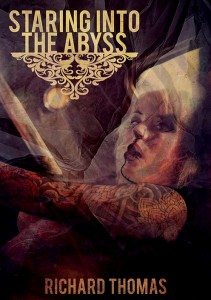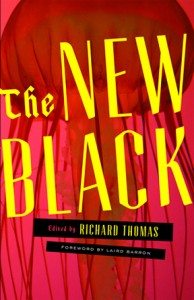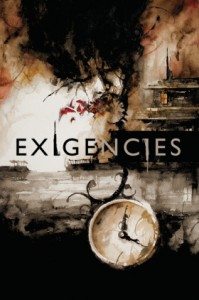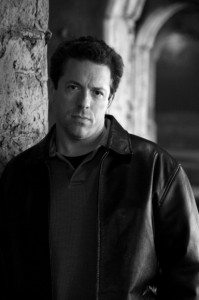Interview conducted by Gordon White
Today our special guest (and birthday boy!) is Richard Thomas – author, editor, Editor-in-Chief, instructor, columnist, etc. etc. He’s had a big year and next year promises to be even bigger, but he made time to talk with us about neo-noir, not-noir, and everything inbetween.
Hellnotes: First off, thanks for joining us. It’s been a busy year for you and it seems like every day you’ve got another announcement, so we’re very grateful to have you here to take a moment to recap, as well as look forward.
Richard Thomas: Thanks for inviting me over. Big fan of Hellnotes.
HL: At first glance, most readers are probably struck by your sheer prolificity. Your Wikipedia page lists over 80 short stories and 5 books either published or scheduled to be published through 2015 (so far), not to mention your work as an editor, an Editor-in-Chief, and a columnist. Given all this, it’s a little surprising that your authorial bio seems to only start in 2008. On paper, you seem to have sprung up overnight, but what went into that beforehand?

HL: To keep up that pace, what’s your writing schedule like? What changes have you made as your career progresses, either from lessons learned or the increase in professional demands?
RT: It really depends on the day. I have no set schedule. It’s whatever’s the most pressing. I will spend the rest of 2014 writing my second novel with Random House Alibi, The Breaker, as I turn in the final edits on my first book with them, Disintegration. I’ll have edits on my novella in The Soul Standard, alongside Nik Korpon, Axel Taiari, and Caleb Ross, with Dzanc Books in 2015 as well. I read and edit novels and collections at Dark House Press, where I’m Editor-in-Chief. I try to write short stories now and then, when approached privately, or if I see a good open call, a theme or genre that I like. I have a column, Storyville, at LitReactor.com, usually 1-3 per month. And I’m doing more and more teaching, with big opportunities next summer in Transylvania, as well as the Iowa Summer Writing Festival, the Novel-in-Progress Bookcamp up in Wisconsin, and a speaking engagement at the Oklahoma Writer’s Federation. And of course the anthologies I’ve been editing, such at The New Black, Exigencies, Burnt Tongues, and The Lineup. Constantly juggling. If I’ve learned anything it’s how to say NO more often—and that I can’t please everyone, all of the time. I do what I can.
HL: In addition to writing, you’re also the Editor in Chief of Dark House Press (a Curbside Splendor imprint), where you’ve done a lot recently to bring “neo-noir” to the fore. Nowhere is this more apparent that in the collection you edited, The New Black (reviewed by Hellnotes here), which could be seen as a manifesto. But, in all that, what is “neo-noir” to you and what is its current state?

HL: Neo-noir seems, at times, to be a tone or a mode or a flavor of literature that can encompass many genres – including horror. In The New Black, for example, Craig Wallwork’s “Dollhouse” steers close to standard “horror” and Brian Evenson’s book-closer “Windeye” is right in line with capital-W Weird fiction. What is it about these stories that pulls them into the neo-noir? Are there any other authors working in the horror/neo-noir overlap that you recommend?
RT: Great question. I think with Craig’s story, it’s the language, the tension, the twist at the end, and the unexpected. With Brian, it’s the atypical horror, the weird, the twist, and then another twist, but mostly the powerful emotion at the end. These are not your typical haunted houses or boogeymen, these are (to me anyway) new ways of playing with reality, surreal stories that definitely slip into the weird, defying expectations. The authors in this collection are exactly the kind of voices that I’m talking about, and I’d also add in people like Laird Barron, Chuck Wendig, Benjamin Whitmer, and many other authors that are writing fiction that doesn’t sit neatly in one genre, giving you the same stories and monsters and narratives we’ve come to expect.
HL: Are there any current Dark House Press releases or ones coming down the pipe that Hellnotes readers should be on the look out for? While we do like horror, we aren’t afraid to broaden our (dark) horizons.

HL: In addition to writing, you also teach a number of workshops with a focus on short fiction. For example, you have an online workshop on “Short Fiction Mechanics” at LitReactor in January (which is currently enrolling) and you’re even going to teach a workshop in Transylvania next year. What is it that draws you to instructing?
Have you noticed an effect on your own writing?
RT: Yeah, I love teaching this class at LitReactor.com, I feel like it really does help the authors that sign up. And the Transylvania thing, that’s so wild, came out of nowhere, but I’m thrilled to go over there. It’s going to be a lot of fun. I love to teach because I’ve learned so much from my time spent in my undergraduate program at Bradley University, in my MFA program at Murray State University, and the various online classes I’ve taken with writers like Jack Ketchum. I just try to share what I know, what I’ve done, and what has helped me, and then let the students apply it to their own writing. Everyone has their own process, their own voice, so I don’t force them to conform, to sound like me (or anyone else) but simply to get the most out of their writing. I didn’t start teaching and editing until the last year or so, because I felt like, “Who the hell am I to tell anyone what to do?” I’m much more comfortable with my own voice now, and I know that I don’t have to feel like I know everything, or have read everything, in order to help other authors get better. I’m much harder on my own writing now, especially the editing. I know when something isn’t working, and I fix it as I go, or start over, or abandon it. Likewise, when I’m in the zone and it feels right, I know to run with it, as my muse is fickle. One week I wrote three stories in three days—and then, nothing new for two months. You never know what’s going to happen.
HL: Most authors, when asked to give advice to fledgling writers, say, “Just write.” As an instructor, however, what craft-based advice do you have for those writers already “Just writing?” Is there a particular skill or technique they should develop to help set them apart?
RT: Pay attention to the weird, the strangeness that seeps into your writing—that’s your voice, that’s what makes your writing unique. Look at what’s come before you, study your genre (or genres) and read all the time—classic, contemporary, popular, literary—and then make it your own. If you like to write heavy setting, do it. If you like to focus on that inciting incident, that tipping point, do it. If you like to write about unique locations, go for it. Embrace the weird—that’s your voice trying to be heard. I know that I have a certain voice—I am not a straight literary writer, I do not like conventional noir or crime, I don’t like a lot of introspection, and I embrace that. Luckily there is a strong demand for dark fiction today, and if I can find a way to harness a page-turning urgency and pair it with layers of imagery and insight, then I feel like I’m doing good work.
HL: Finally, what’s coming up next for you? Meaning, what are you working on at the moment, but also what’s percolating at the edge of your mind? Anything you can tease or hint at or just make up right now?
RT: I’ve touched on a lot of things already, but I have a story in Cemetery Dance #72 out any week now, and I’m really excited about that. Love what they’re doing, and this is definitely one of my white whales. I’ll also be writing The Breaker, which is a novel about abuse, breaking the cycle of that violence, tapping into narratives like The Green Mile, Of Mice and Men, and The Professional. Trying to take my own advice and write something original, which is always difficult, right?
As a bonus, Richard Thomas reached into THE TRICK OR TREAT BOWL our grab bag of less serious questions. The sign said “Take just one,” but you should know by now Richard doesn’t do anything half-way.
HL: Although you’re *the* Richard Thomas in literary circles, Google’s top result for “Richard Thomas” is the actor, who currently appears on television as Agent Frank Gaad on FX’s spy drama The Americans. Would you make a good spy? What would be your call sign and special skill(s)?
RT: THAT guy. Always stealing my thunder, John Boy Walton. Funny story, he starred in Stephen King’s television mini-series It, and played the writer. So I’d see my name up on the set in big letters. I think I would make a good spy, as I like the night, the darkness, and even did some theater back in high school and college. Call sign? How about 2112, and my special skill would be forging important documents.
HL: Pitch us a show called “Orange is the Neo-Noir” in 140 characters or less.
RT: Don’t call him a tangerine or “cutie”—this Blood Orange is out for justice. Juice will spill—drink it up. New, from Nickelodeon.
HL: What’s the one book you keep meaning to finish, honest, but you just haven’t been able to? (You know the one) Do you want to take this opportunity to apologize to the author?
RT: House of Leaves by Mark Z. Danielewski. I have stopped and started that book SO many times. And it’s really compelling, I know if I can just carve out a few days of quiet to really let it all sink in, then I think it’ll be something really special. Sorry, Mark—it’s not you, it’s me.
HL: What is the *least* neo-noir book you’ve read in the past year that you would feel comfortable A) copping to and B) recommending? Feel free to show us your soft side.
RT: I’ve been reading The Chronicles of Narnia to my kids for a few months now, but I guess that’s really an excuse, passing it off on them. I just finished re-reading Me Talk Pretty by David Sedaris, that’s about as light as I get, I guess. I haven’t laughed this hard since Meaty by Samantha Irby.

Personal Links:
Facebook: https://www.facebook.com/richardgthomas3
Twitter: https://twitter.com/wickerkat
Website: http://www.whatdoesnotkillme.com
Dark House Press:
http://www.darkhousepress.com
https://www.facebook.com/pages/Dark-House-Press/567172509981629








